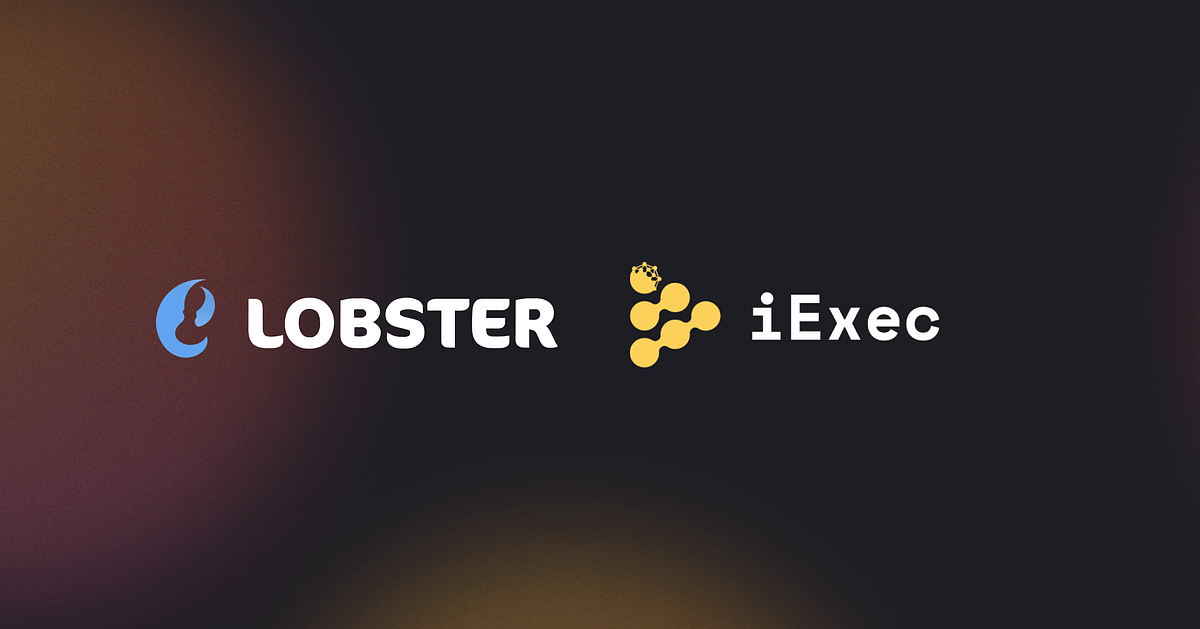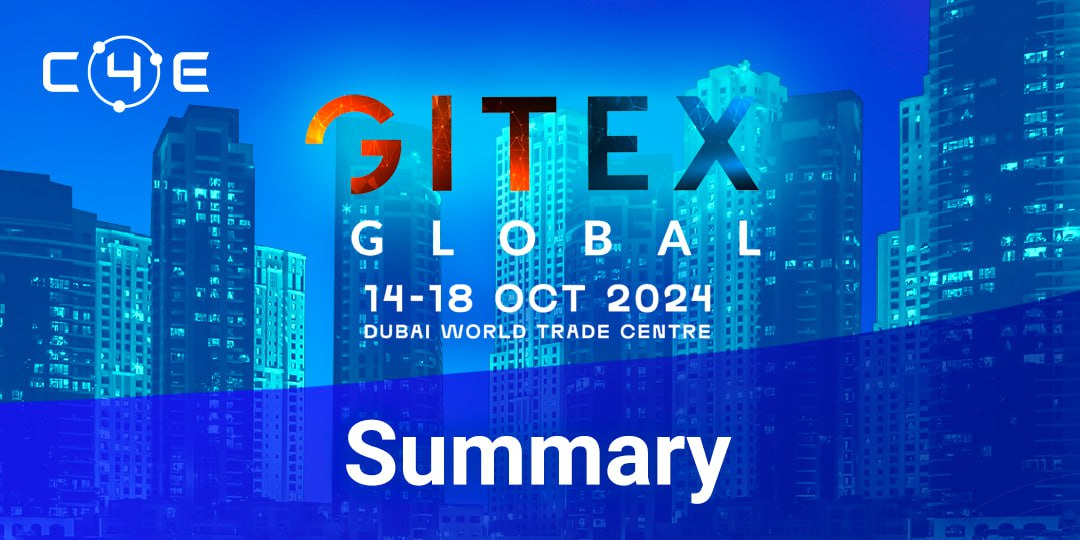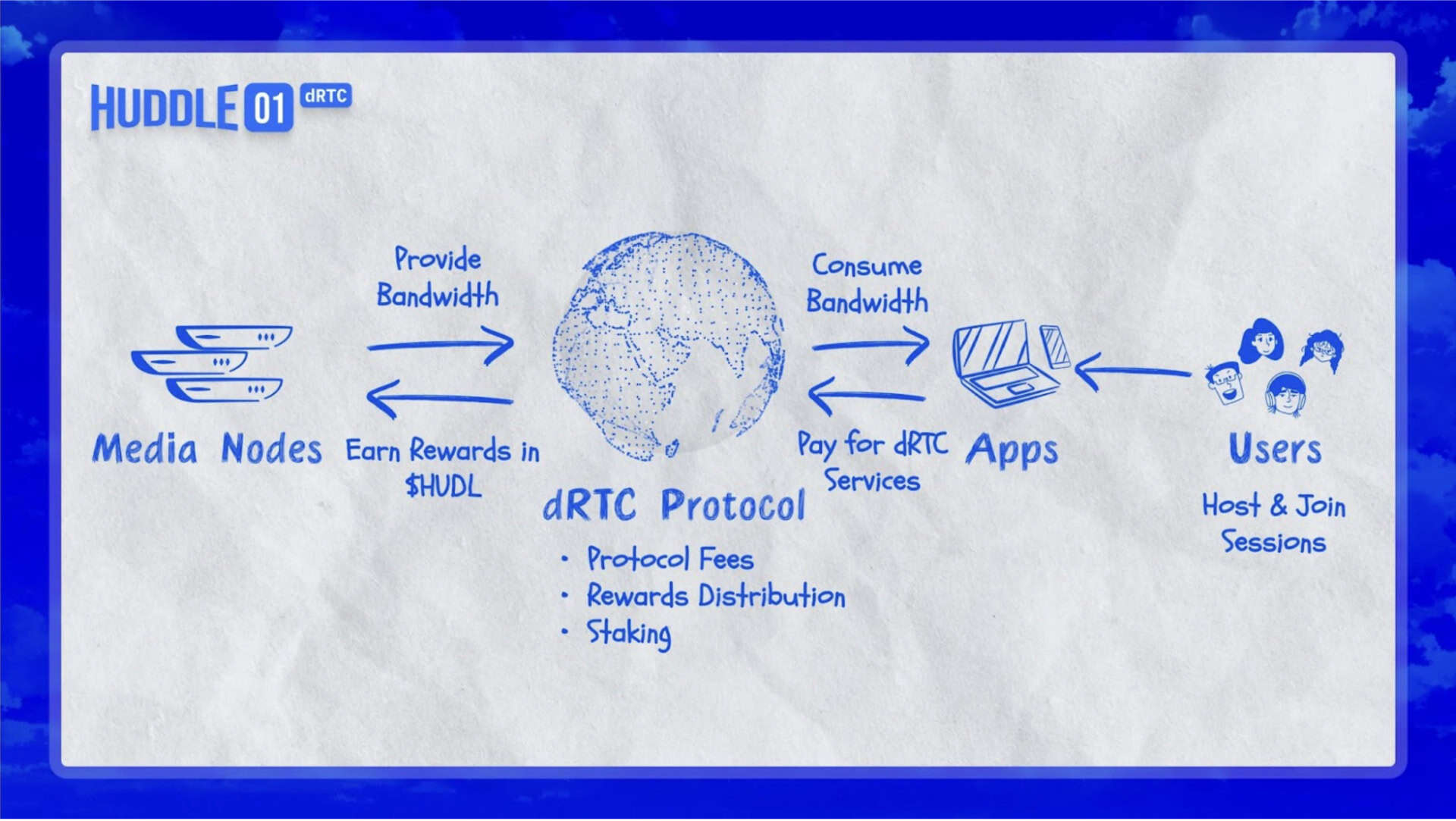Latest DePIN News

a year ago
iExec and Lobster Revolutionize Web3 Communication with Privacy-First Innovation
The recent partnership between iExec and Lobster marks a significant advancement in Web3 communication, particularly in the realm of privacy. With the integration of iExec's Web3Mail, Lobster can now send encrypted emails to users without ever needing to store or even access their email addresses. This innovation utilizes confidential computing and blockchain technology to ensure secure communications while granting users complete control over their privacy. By leveraging Intel SGX hardware encryption, the collaboration has created a tamper-proof communication method that effectively protects users from data breaches and unsolicited spam.
This partnership not only enhances user privacy but also opens up new avenues for developers interested in creating privacy-first applications. iExec is actively encouraging builders to participate in their grants program, which aims to support innovative projects that align with their ecosystem. Interested developers can submit proposals detailing their project's technical aspects, purpose, and long-term benefits. Selected applicants will undergo a technical interview, and grants will be awarded based on the achievement of specific milestones, fostering a collaborative environment for innovation.
Looking ahead, the potential of this partnership is vast, and both iExec and Lobster are excited about the future of privacy-first technology. Users are invited to experience this new level of privacy by subscribing to Lobster's secure newsletter. Additionally, developers are encouraged to explore the opportunities available through iExec's grants program, as this collaboration is just the beginning of what can be achieved in the realm of secure communications and privacy-focused applications.

a year ago
Decentralized Technologies Transforming Industries
In the rapidly evolving digital landscape, decentralized technologies are transforming traditional industries by providing safer and more efficient alternatives. Leading platforms such as Filecoin, Bittensor, Theta Network, and Arweave are at the forefront of this revolution, each addressing unique challenges in cloud storage, AI development, video streaming, and data retention. By leveraging blockchain technology, these projects enhance security, fairness, and long-term reliability, paving the way for a future where control is distributed and innovation flourishes without boundaries.
Filecoin is revolutionizing cloud storage by decentralizing data distribution across a network of nodes, significantly reducing risks associated with centralized providers like Amazon and Google. With a market cap of $2.34 billion, Filecoin allows users to pay for storage using its native token while rewarding miners for enhancing network security. This innovative approach minimizes the single point of failure typical in traditional cloud services, ensuring that data remains safe and accessible.
Bittensor, with a market cap of $4.39 billion, is reshaping AI development through a decentralized machine learning network. By incentivizing contributors with its native TAO token, Bittensor democratizes AI training and fosters open-source collaboration. Similarly, Theta Network, valued at $1.35 billion, enhances video streaming quality in underserved areas by allowing users to share bandwidth. With its dual-token system, THETA for governance and TFUEL for transactions, Theta Network is a game-changer in the video streaming sector. Lastly, Arweave, with a market cap of $2.78 billion, offers permanent storage solutions, ensuring data availability forever through its unique AR token incentive model. Together, these platforms exemplify the potential of decentralized technologies to redefine industry standards and practices.

a year ago
Studio369 Moves MetalCore to Solana Blockchain for Enhanced Gaming Experience
Game development company Studio369 has announced the migration of its mech shooter title MetalCore to the Solana blockchain, aiming to enhance the gaming experience through faster on-chain transactions. As of October 24, the Solana blockchain is processing an impressive average of about 3,000 transactions per second, a key performance metric that underscores its capabilities. MetalCore will leverage Solana Labs' GameShift platform, which integrates a storefront and payment systems for in-game purchases. This free-to-play open-world game features both player-versus-player (PvP) and player-versus-environment (PvE) battles, allowing players to acquire assets from defeated opponents and convert them into Web3 assets for trading.
The migration to Solana comes as the network has been attracting various protocols looking to improve scalability and reduce costs. Studio369's decision reflects a broader trend, as other projects like MetaBlox's Roam network and the decentralized wireless communications protocol Helium have also transitioned to Solana for its faster transaction speeds and scalability. With the gaming sector increasingly gravitating towards blockchain technology, Solana's infrastructure is positioned to support these developments effectively.
Despite its advantages, Solana has faced challenges, including significant periods of downtime that have raised concerns about its reliability. The latest outage, which lasted about five hours, occurred on February 6, 2024. In response to these issues, the Solana Foundation is working on the Firedancer upgrade, with a full version expected in 2025 and interim updates to manage the growing network activity. As Solana continues to evolve, it remains a focal point for gaming and decentralized infrastructure projects seeking robust blockchain solutions.

a year ago
Vitalik Buterin Outlines Ethereum's Path to a Unified Ecosystem
Ethereum co-founder Vitalik Buterin has recently highlighted the significant challenges facing the Ethereum network, particularly the urgent need for a unified ecosystem. In his latest insights, he discusses the future goals of Ethereum, especially during an upcoming phase known as "The Surge." This phase aims to enhance scalability, enabling swift cross-chain transfers and creating a more cohesive user experience. Buterin points out that Ethereum's biggest hurdle is its fragmented ecosystem, which currently consists of various Layer 2 (L2) solutions, each with unique features. He envisions a future where these solutions achieve interoperability, allowing them to function as a single, cohesive unit rather than 34 separate blockchains, ultimately fostering innovation and improving user experience.
The ambitious goals of "The Surge" include achieving over 100,000 transactions per second (TPS) across both Layer 1 (L1) and Layer 2 solutions. However, Buterin emphasizes that this scalability must not compromise decentralization and security, which are core properties of Ethereum. He advocates for the integration of L2 solutions that maintain trustlessness, openness, and resistance to censorship. Additionally, Buterin stresses the importance of scaling the base chain, as a highly scalable L2 could pose risks if L1 struggles to process transactions. Instead of merely increasing the gas limit, he proposes making specific computations cheaper while preserving decentralization, suggesting improvements like multidimensional gas pricing.
Furthermore, Buterin underscores the necessity of enhancing user experience within the Ethereum ecosystem. He believes that using L2 networks should feel seamless, allowing users to send tokens across chains without the technical burden of manual bridging. As Ethereum transitions from a monolithic roadmap to a rollup-centric approach, Buterin acknowledges the unique challenges this shift has introduced. The recent Dencun upgrade has been pivotal in scaling Ethereum, but it also raises concerns about siphoning users from the mainnet. Ultimately, Buterin's vision for Ethereum is to address these challenges while preserving its foundational values, ensuring that the evolution towards an L2-dominated ecosystem does not compromise what makes Ethereum unique.

a year ago
Streamr: Revolutionizing Real-Time Data Streaming in a Decentralized World
Streamr is an innovative decentralized network designed for streaming live media and real-time data securely and at scale. It offers a range of use cases, including AI data delivery, live video streaming, and communication without the need for centralized servers. The platform allows users to stream verifiable data from IoT devices and networked hardware, making it a versatile solution for various industries. Additionally, Streamr facilitates data monetization by enabling users to buy and sell subscriptions to data streams, thus creating a marketplace for real-time data exchange.
The Streamr Network operates on a robust and permissionless peer-to-peer architecture, which enhances its scalability and resilience against malicious attacks. By leveraging companion blockchains such as Ethereum, Gnosis, and Polygon, Streamr ensures secure identity management and payment processing. This decentralized approach addresses the limitations of traditional centralized services, which often suffer from single points of failure and vendor lock-in. With a focus on low latency and secure messaging, Streamr is poised to become a critical infrastructure layer for the emerging decentralized web (Web3).
Founded in 2017 by a team of visionaries, Streamr has grown into a collaborative open-source project with around 30 contributors worldwide. Governance within the project is facilitated through voting mechanisms using the $DATA token, which serves as the backbone of the network. The recent release of the complete $DATA tokenomics marks a significant milestone in the Streamr roadmap, further solidifying its position in the decentralized data ecosystem. Node operators play a crucial role in securing and relaying data streams, while delegators can earn revenue shares by supporting these operators, fostering a community-driven approach to data management.

a year ago
C4E and Grenton Showcase Blockchain and AI Solutions at Gitex Global Conference
Last week, the Gitex Global Conference took place from October 14th to 18th in Dubai, UAE, where our team had the opportunity to collaborate with our partner Grenton. This annual event serves as a significant platform for fintech decision-makers to connect, share ideas, and network. Located at the Dubai World Trade Centre, Gitex Global attracted tens of thousands of participants, including entrepreneurs, investors, and industry insiders. Our focus during the conference was to showcase the integration of blockchain technology with AI and Smart Home solutions, emphasizing their potential benefits for sustainability and the development of smart cities.
During the event, we engaged with key decision-makers and investors, presenting how our joint solutions can enhance community engagement and facility management through innovative technologies. Notably, Bartlomiej Gierszyn, CEO of Grenton, delivered a presentation during the Tech Talks segment of Gitex 2024. He highlighted the aggregation of data from smart homes for notifications and alerts, the role of AI in facility management, and the application of blockchain for fostering community engagement. This presentation not only provided valuable insights but also sparked significant interest among potential investors and attendees.
Overall, our experience at Gitex Global was highly productive, allowing us to expand our network and generate interest in our collaborative solutions with Grenton. We believe that the conference could have been even more beneficial with a longer duration, as the discussions and networking opportunities were incredibly valuable. To stay updated on our developments and future initiatives, we encourage following our social media channels.

a year ago
XProtocol Announces Launch of Crypto-Powered Android Phone XForge
XProtocol has officially announced the launch date for its innovative crypto-powered Android phone, the XForge, set for October 30, 2024. This entertainment-focused Ethereum layer-3 network is offering a pre-sale of 10,000 units, each priced at $299. The launch follows a successful Xardian node sale aimed at empowering and rewarding communities. According to Dragonix, a contributor to XProtocol, the initial pricing is expected to increase after the first batch. Each phone will also come with free Xardian Nodes, allowing users to participate in the DePIN network and earn various cryptocurrency-based incentives directly from their devices.
In addition to the phone launch, XProtocol has completed multiple fundraising rounds totaling $5.2 million, with participation from notable investors such as Dragonfly Capital, Coinfund, and Razer. The company’s unique proposition lies in its use of Base superchain technology, which provides a scalable and developer-friendly platform for entertainment and gaming projects. XProtocol is compatible with all Ethereum Virtual Machine (EVM) projects, facilitating easy migration and offering tools for developers. The upcoming dApp store on the phone will serve as a gateway for users to access web3 applications built on the XProtocol superchain.
The XForge is designed with high-end specifications tailored for gaming, featuring an Octa-Core CPU, Dual Nano SIM capability, a 6.67” AMOLED display, 8GB of RAM, and 256GB of storage. The inclusion of Xardian nodes aims to enhance network decentralization, with operators earning rewards for their participation in the consensus process. Furthermore, XProtocol has locked in 20% of its total token supply for node license holders, to be distributed over 36 months following the mainnet launch later this year. With a team experienced in web3 gaming, XProtocol is poised to revolutionize blockchain-based gaming, enabling creators to develop and scale consumer-focused products effectively.

a year ago
Exploring the Future of Decentralized Infrastructure in Web3
In episode 62 of the Hashing It Out podcast, host Elisha Owusu Akyaw engages with Harrison Hines, CEO and co-founder of Fleek Network, and Kyle Okamoto, CTO of Aethir, to discuss the transformative potential of decentralized physical infrastructure networks (DePIN). They delve into how DePIN aims to disrupt traditional internet infrastructure by decentralizing access to essential resources like GPUs and cloud services, challenging the dominance of major players such as AWS and Google. Hines emphasizes that DePIN represents an evolution similar to what Uber and Airbnb achieved in their respective industries, allowing for community ownership and operation of infrastructure instead of centralized control by corporations.
Okamoto critiques the traditional cloud computing model, highlighting its inefficiencies and the oligopolistic nature of leading companies that limit access to critical resources. He argues that decentralized networks, like those developed by Aethir, can democratize access to computing power while enhancing operational efficiency. Both guests acknowledge the complexities of decentralization, noting that not all Web3 projects are fully decentralized, particularly due to the centralization of DNS. However, they express optimism about the ongoing evolution of the sector and the gradual decentralization of various infrastructure components.
The episode provides valuable insights into the potential of DePIN to revolutionize existing industries, while also addressing the challenges that lie ahead in achieving full decentralization. The discussion sets the stage for future explorations of how DePIN could influence other sectors within the tech landscape, making it a significant topic for enthusiasts and professionals alike.

a year ago
The Rise of Crypto + AI: A New Frontier in Web3 Investment
In recent weeks, the convergence of cryptocurrency and artificial intelligence (AI) has captured the attention of Web3 venture capital firms, signaling a significant shift in investment focus. Coinbase Ventures, a prominent player in the crypto space, has published an official thesis outlining its commitment to Crypto + AI projects. Hoolie Tejwani, head of Coinbase Ventures, believes that blockchain and generative AI will intertwine to form the foundation of our digital lives. This shift is not isolated; other venture capital firms, such as CoinFund and a16z, are also investing heavily in this emerging sector, with a reported $213 million directed towards AI projects in the third quarter of 2024.
Coinbase Ventures categorizes the Crypto + AI landscape into three primary buckets. The first bucket focuses on AI agents that utilize cryptocurrency for transactions, suggesting a future where AI handles various tasks and requires a seamless payment method. Projects like Skyfire and Payman are already exploring this concept, with Payman enabling AI agents to transact with humans. The second bucket encompasses decentralized AI systems, emphasizing the importance of data in training AI. Initiatives like Vana are pioneering ways for users to monetize their data while maintaining privacy, potentially revolutionizing how AI is trained and governed.
The third bucket delves into on-chain AI, where AI generates software code and smart contracts in real-time. This innovative approach could redefine how applications are built and operated on blockchain networks. However, the rapid proliferation of Crypto + AI projects raises questions about their substance and viability. While some view this integration as a necessary evolution, others caution against the hype surrounding it. Ultimately, the future of Crypto + AI will depend on its ability to provide tangible benefits and empower users, rather than merely riding the wave of technological trends.

a year ago
Huddle01 Launches Node Sale to Transform Decentralized Communications
Huddle01, a pioneer in decentralized real-time communications (dRTC), has launched a whitelist for its upcoming node sale, aiming to revolutionize audio and video conferencing. This initiative marks the first Decentralized Physical Infrastructure Network (DePIN) specifically designed for real-time communication. By leveraging unused internet bandwidth through node operators, Huddle01 enables seamless communication that can rival established platforms like Zoom and Google Meet. Since its inception, Huddle01 has facilitated over 7 million minutes of meetings across more than 100,000 events, and the addition of new nodes is expected to enhance connectivity in emerging markets while allowing node license holders to earn rewards.
The Huddle01 Media Nodes serve as the backbone of this innovative network, addressing the high operational costs and latency issues associated with centralized RTC networks. By significantly reducing the reliance on traditional data centers, Huddle01 can lower developers' server costs for audio and video calls by up to 95% compared to conventional services like AWS. CEO Ayush Ranjan emphasizes that the media nodes will improve latency, particularly in regions with a dense cluster of nodes, thus providing a competitive edge over existing web2 solutions. The platform's native app, Huddle01 Meet, integrates web3 tools, allowing users to connect wallets and utilize NFT avatars, further enhancing the user experience.
The node sale will offer 46,900 Huddle Media Nodes, starting at $320 each, and will occur in two phases. The first phase will see 20,000 nodes available for purchase, with participants receiving an NFT key upon purchase. The sale is structured to reward early participants with higher returns. Additionally, an incentivized testnet will launch shortly after the sale, rewarding active node holders with $HUDL tokens. With a total supply of 200 million $HUDL, the project aims to engage a broad user base and enhance the decentralized communication landscape.
Signup for latest DePIN news and updates